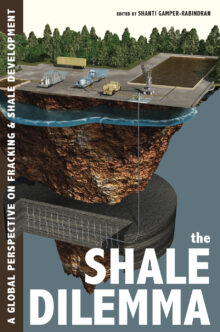
Shanti Gamper-Rabindran
Shanti Gamper-Rabindran is associate professor in the Graduate School of Public and International Affairs at the University of Pittsburgh. She served as the August-Wilhelm Scheer Visiting Professor at the Technical University of Munich, Germany, at the Chair of Environment and Climate Policy.
The Shale Dilemma
A Global Perspective on Fracking and Shale Development
The US shale boom and efforts by other countries to exploit their shale resources could reshape energy and environmental landscapes across the world. But how might those landscapes change? Will countries with significant physical reserves try to exploit them? Will they protect or harm local communities and the global climate? Will the benefits be shared or retained by powerful interests? And how will these decisions be made?
The Shale Dilemma brings together experts working at the forefront of shale gas issues on four continents to explain how countries reach their decisions on shale development. Using a common analytical framework, the authors identify both local factors and transnational patterns in the decision-making process. Eight case studies reveal the trade-offs each country makes as it decides whether to pursue, delay, or block development. Those outcomes in turn reflect the nature of a country’s political process and the power of interest groups on both sides of the issue. The contributors also ask whether the economic arguments made by the shale industry and its government supporters have overshadowed the concerns of local communities for information on the effects of shale operations, and for tax policies and regulations to ensure broad-based economic development and environmental protection.
As an informative and even-handed account, The Shale Dilemma recommends practical steps to help countries reach better, more transparent, and more far-sighted decisions.

